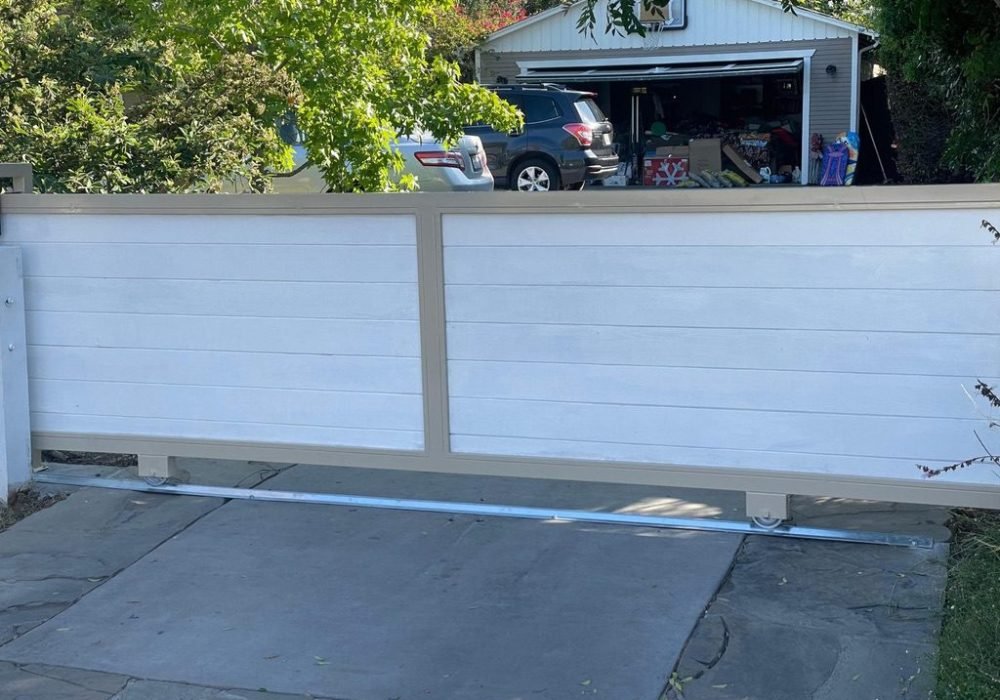When it comes to choosing the right fence for your property, durability is a key factor. Not only does a fence offer security and privacy, but it also enhances the aesthetic appeal of your home. But how long can you expect a wood fence to last? This blog will dive into the factors that affect the lifespan of wood fences and explore alternative materials that might offer even more longevity.
How Long Does a Wood Fence Last? : What to Expect
Wood fences are popular for their natural beauty and versatility, but their lifespan can vary depending on a variety of factors. On average, a well-maintained wood fence can last between 15 to 20 years, but this number can change based on several elements:
- Type of Wood: The type of wood you choose plays a significant role in how long your fence lasts. Hardwoods like cedar and redwood are naturally resistant to rot and insects, giving them a longer lifespan than softer woods like pine. Pressure-treated wood is also an option, as it is treated with chemicals to resist decay, insects, and moisture.
- Climate Conditions: Wood fences in dry climates will generally last longer than those in humid or rainy areas, where moisture can accelerate decay. Extreme weather conditions like harsh sunlight or heavy snowfall can also cause wood to deteriorate more quickly.
- Maintenance: A wood fence requires regular upkeep to maximize its lifespan. This includes sealing or staining every few years to protect it from moisture and UV rays, as well as addressing issues like rot or insect damage early.
Tips to Maximize the Life of Your Wood Fence
If you want your wood fence to last for decades, regular maintenance is key. Here are some practical tips to keep your fence in good shape:
- Seal or Stain the Wood: Applying a waterproof sealant or stain to your fence every 2-3 years will protect it from moisture and prevent wood rot.
- Regular Inspections: Check your fence for signs of damage, such as rot, cracks, or insect infestations. Early detection can help you make minor repairs before they turn into major problems.
- Repair Rot and Damage: Don’t let small sections of rot or insect damage spread. Repairing or replacing affected sections will prolong the life of the entire fence.
- Prevent Mold and Mildew: Clean your fence periodically with a mild soap and water solution to remove any mold, mildew, or algae, especially in humid climates.
Alternatives to Wood Fencing: Longer Lifespans and Less Maintenance
While wood fences offer a traditional, natural look, alternative materials may better suit homeowners seeking durability and low-maintenance options. Here are some popular alternatives that can last even longer than wood:
- Vinyl Fencing
Vinyl has become a top choice for homeowners who want a low-maintenance fence. It doesn’t rot, warp, or splinter like wood, and it’s resistant to pests and weather. Vinyl fences can last up to 30 years or more with virtually no maintenance, aside from occasional cleaning. For those seeking both durability and a clean, modern look, vinyl is an excellent option. - Metal Fencing
Metal fences, such as aluminum and steel, are incredibly durable and can last 50 years or more with minimal care. These fences are resistant to weather, insects, and rot, making them ideal for long-term use. Additionally, they provide excellent security, making them a popular choice for homeowners who prioritize safety and longevity. - Composite Fencing
Composite fences combine wood fibers and recycled plastic, offering the look of wood with the durability of synthetic materials. These fences are resistant to rot, insects, and weather damage, with a lifespan of around 20-25 years. Composite fencing is an eco-friendly option for those who want the aesthetic of wood without the high maintenance requirements.
Making the Right Choice for Your Property
Choosing the right fencing material depends on several factors, including your priorities for aesthetics, maintenance, and durability. Here’s a quick comparison to help guide your decision:
- Wood Fencing: Offers a natural, classic look but requires regular maintenance and has a shorter lifespan (15-20 years).
- Vinyl Fencing: Low-maintenance with a modern appearance and a longer lifespan (up to 30 years).
- Metal Fencing: Offers strength, security, and longevity (50+ years) but may have higher upfront costs.
- Composite Fencing: Eco-friendly, low-maintenance, and long-lasting (20-25 years), with the appearance of natural wood.
Budget Considerations
While wood fences may have a lower initial cost, it’s important to consider the long-term maintenance expenses that come with them. Over time, regular sealing, staining, and repairs can add up. In contrast, materials like vinyl, metal, and composite may have higher upfront costs, but their longevity and minimal maintenance needs can make them more cost-effective in the long run. There are many companies you can trust for such projects, and Fency Builders stands out by offering reliable service, free quotes, and expert advice to help you choose the best fencing solution for your home.
Environmental Impact
For eco-conscious homeowners, the sustainability of your fencing material may be a deciding factor. Wood is a renewable resource, but the environmental impact can vary depending on the logging practices and type of wood used. Composite fencing, made from recycled materials, offers an eco-friendly alternative. Metal fencing is also highly recyclable, making it a greener option at the end of its life.
Wrapping Up: Making the Best Choice for Your Fence
In conclusion, the longevity of a wood fence depends on factors such as the type of wood, climate conditions, and the level of maintenance it receives. If you’re looking for a fence with classic charm and are willing to put in the effort to maintain it, a wood fence may be the perfect choice for you. However, if durability and low maintenance are top priorities, you may want to consider alternatives like vinyl, metal, or composite.
No matter which material you choose, investing in a high-quality fence enhances your property’s curb appeal, security, and privacy. Ready to install or replace your fence? Contact professional fence builders to ensure your new fence is built to last and tailored to your specific needs.
Check Out Our Fence Building Services
Looking for durable and aesthetically pleasing fencing options? Our experienced fence builders specialize in designing and installing a range of fences that meet your unique requirements. Contact us today to get a free consultation!
Frequently Asked Questions
How long does a wood fence last on average?
On average, a well-maintained wood fence can last between 15 to 20 years. However, factors such as the type of wood, climate, and maintenance routines can either shorten or extend this lifespan.
How long does a wood fence last if it’s made from cedar or redwood?
A wood fence made from cedar or redwood can last up to 25 years or more. These types of wood are naturally resistant to rot and insects, which contributes to their longer lifespan compared to other wood types.
How long does a wood fence last in a humid climate?
In humid climates, wood fences tend to last closer to the lower end of the average lifespan, around 10 to 15 years. Moisture can lead to rot and decay, so regular sealing and maintenance are essential to prolong its life.
Why should I choose a professional for wood fence installation?
Choosing a professional for your wood fence installation ensures that the job is done right the first time. Professional installers like Fency Builders have the expertise and tools to build a fence that will last longer, withstand harsh weather, and look great. Plus, they offer free quotes, so you can plan your project with confidence and peace of mind.
How long does a wood fence last without proper maintenance?
Without regular maintenance like sealing, staining, or repairing, a wood fence’s lifespan can be significantly reduced, sometimes lasting as little as 7 to 10 years due to exposure to the elements.
How long does a wood fence last compared to vinyl or composite fences?
A wood fence typically lasts 15 to 20 years, while vinyl or composite fences can last 25 to 30 years or more. These alternative materials require less maintenance and are more resistant to weathering, rot, and pests.
How can I enhance the look of my wooden fence?
A wooden fence can be easily enhanced with a fresh coat of paint or stain. This not only improves its appearance but also adds a layer of protection from the elements. Consider adding decorative features like post caps or plantings around the fence to boost curb appeal. Fency Builders can help you with personalized design ideas to make your fence stand out.
Why is regular maintenance essential for a wood fence?
Regular maintenance is crucial for a wood fence to prevent damage caused by weather, pests, and rot. Without proper care, the wood can deteriorate faster, leading to costly repairs or even full replacements. By sealing, staining, and repairing any issues promptly, you can ensure your fence remains strong and beautiful for years. For the best maintenance services, Fency Builders offers reliable and professional solutions to keep your fence in top shape.
What are the signs that my wood fence needs repairs?
Common signs that your wood fence may need repairs include warping, rotting, broken boards, and loose posts. If you notice discoloration, cracking, or insect damage, it’s time to act quickly. Ignoring these issues can cause them to worsen over time. Fency Builders specializes in expert fence repairs, ensuring your fence remains sturdy and safe.
What’s the best way to prevent my wood fence from rotting?
The best way to prevent wood rot is by ensuring proper drainage around the fence, sealing it regularly, and checking for moisture buildup. Rot is often caused by prolonged exposure to moisture, so keeping the wood dry is key. For expert advice and installation techniques that prevent rot from the start, trust Fency Builders.

